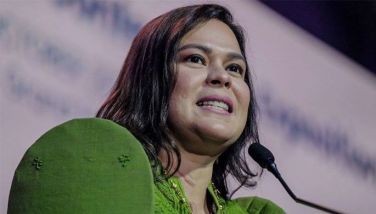Landbank finds more tax diversions
August 21, 2002 | 12:00am
The Land Bank of the Philippines has uncovered more tax diversion scams, amounting to some P228 million, involving its Binangonan, Rizal branch, LandBank president Margarito Teves said yesterday.
Teves said this was the finding of the internal audit the bank is conducting among its branches after the Bureau of Internal Revenue (BIR) uncovered in July a tax payment diversion scam amounting to some P203 million.
This brought to P440 million the total amount of tax money that was apparently diverted into at least four personal bank accounts that now contain only P9 million.
The remaining P431 million in tax money, Teves said, has disappeared but charges have been filed against the persons who are suspected of being involved in the scam.
Teves said the funds represent the tax payments of seven large companies whose checks, payable to the BIR, were diverted into the accounts used by Roberto Lucero, Alam Clemente, Jose Francisco and Joven Aquino.
Officials stressed, however, that the companies were not involved in the scam because they had records to prove that the companies paid their taxes.
The National Bureau of Investigation (NBI) filed on Monday charges of syndicated estafa against five other people in connection with the tax diversion scam.
NBI Director Reynaldo Wycoco identified those charged as Ronilo Yu, of Estancia, Iloilo and vice president for finance and administration of the Lorenzo Shipping Corp.; businessman Teodorico Rivera, of Marilao, Bulacan; Resty Rivera, of Parañaque City, a certain Joven Aquino, of Cardona, Rizal; and two still unidentified persons.
Yu and the others were charged with 18 counts of estafa, Wycoco said.
According to the NBI, Yu, Teodorico Rivera, his niece Resty and two others allegedly connived to divert the tax payments of Lorenzo Shipping Corp. to the account of Aquino at the LandBank’s Binangonan branch.
In order to make it appear that the company actually paid its taxes, fake LandBank receipts, tax returns and other fake documents were submitted to the accounting department of Lorenzo Shipping Corp.
The NBI said the scheme was devised by Yu and involved diverting tax payments to the dummy account between February and June 2002.
The funds in the dummy account have all since been withdrawn while Yu is believed to have fled the country, the NBI added.
Teves said the incident appeared to have been isolated from the Binangonan branch case but the LandBank internal audit, which has covered 27 branches, is still ongoing.
Teves explained that the diversion was done by switching the check paid by the taxpayer and crediting the same exact amount to the fictitious account.
"We have not determined exactly where the switching happens, but as far as we can tell, it could happen either within the bank, in the clearing house or even at the BIR," Teves said.
Ordinarily, the taxpayer paying through the Landbank is issued a BIR certification and official receipt as proof that it has paid taxes. Teves said, however, that the checks were allowed to clear but the proceeds of the check was deposited to fictitious accounts instead of the National Treasury.
Teves said the taxpayers were issued fake certifications and fake official receipts so that when the BIR checks its own records, it would have no record of payment at any time.
"This happens simultaneously which means that the person who deposited had to have known the exact amount to the last cent so that the numbers will balance when the check is cleared," Teves said.
Teves said this was the finding of the internal audit the bank is conducting among its branches after the Bureau of Internal Revenue (BIR) uncovered in July a tax payment diversion scam amounting to some P203 million.
This brought to P440 million the total amount of tax money that was apparently diverted into at least four personal bank accounts that now contain only P9 million.
The remaining P431 million in tax money, Teves said, has disappeared but charges have been filed against the persons who are suspected of being involved in the scam.
Teves said the funds represent the tax payments of seven large companies whose checks, payable to the BIR, were diverted into the accounts used by Roberto Lucero, Alam Clemente, Jose Francisco and Joven Aquino.
Officials stressed, however, that the companies were not involved in the scam because they had records to prove that the companies paid their taxes.
The National Bureau of Investigation (NBI) filed on Monday charges of syndicated estafa against five other people in connection with the tax diversion scam.
NBI Director Reynaldo Wycoco identified those charged as Ronilo Yu, of Estancia, Iloilo and vice president for finance and administration of the Lorenzo Shipping Corp.; businessman Teodorico Rivera, of Marilao, Bulacan; Resty Rivera, of Parañaque City, a certain Joven Aquino, of Cardona, Rizal; and two still unidentified persons.
Yu and the others were charged with 18 counts of estafa, Wycoco said.
According to the NBI, Yu, Teodorico Rivera, his niece Resty and two others allegedly connived to divert the tax payments of Lorenzo Shipping Corp. to the account of Aquino at the LandBank’s Binangonan branch.
In order to make it appear that the company actually paid its taxes, fake LandBank receipts, tax returns and other fake documents were submitted to the accounting department of Lorenzo Shipping Corp.
The NBI said the scheme was devised by Yu and involved diverting tax payments to the dummy account between February and June 2002.
The funds in the dummy account have all since been withdrawn while Yu is believed to have fled the country, the NBI added.
Teves said the incident appeared to have been isolated from the Binangonan branch case but the LandBank internal audit, which has covered 27 branches, is still ongoing.
Teves explained that the diversion was done by switching the check paid by the taxpayer and crediting the same exact amount to the fictitious account.
"We have not determined exactly where the switching happens, but as far as we can tell, it could happen either within the bank, in the clearing house or even at the BIR," Teves said.
Ordinarily, the taxpayer paying through the Landbank is issued a BIR certification and official receipt as proof that it has paid taxes. Teves said, however, that the checks were allowed to clear but the proceeds of the check was deposited to fictitious accounts instead of the National Treasury.
Teves said the taxpayers were issued fake certifications and fake official receipts so that when the BIR checks its own records, it would have no record of payment at any time.
"This happens simultaneously which means that the person who deposited had to have known the exact amount to the last cent so that the numbers will balance when the check is cleared," Teves said.
BrandSpace Articles
<
>
- Latest
- Trending
Trending
Latest
Trending
Latest
Recommended
































